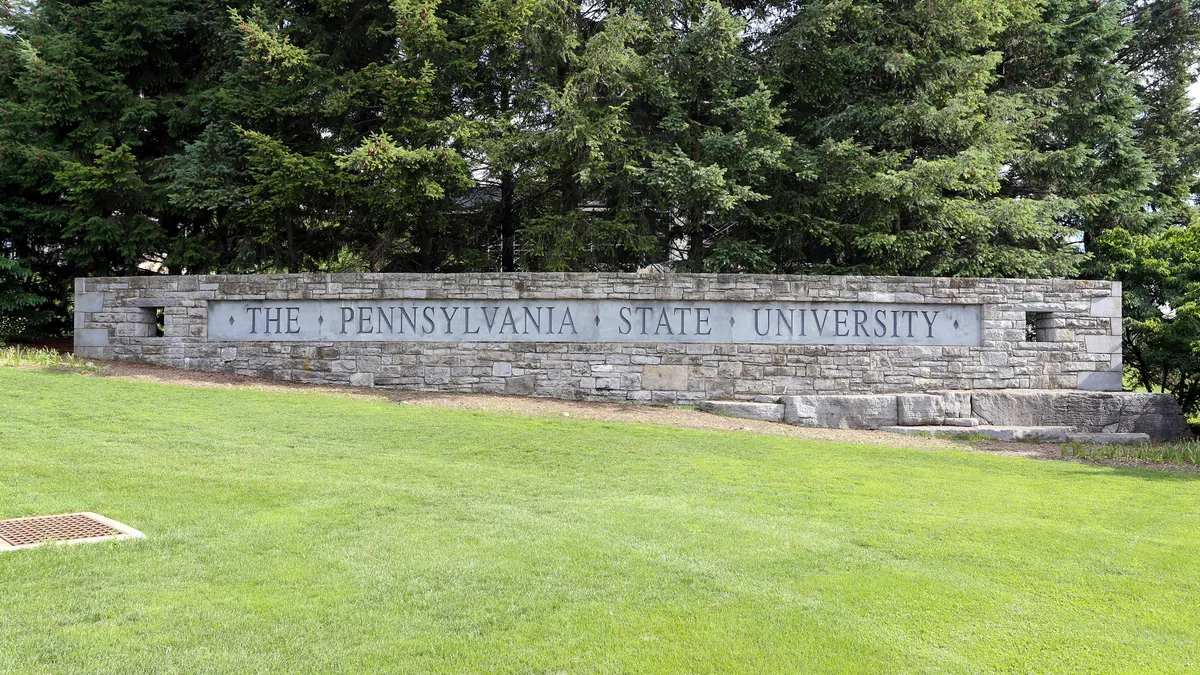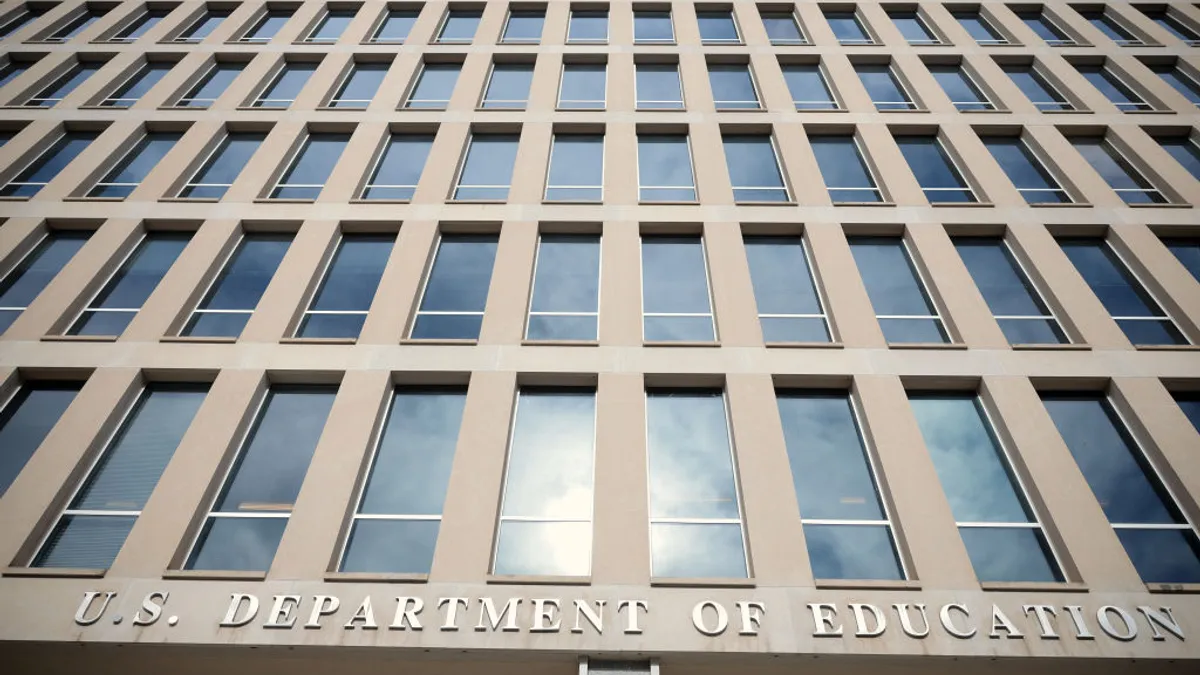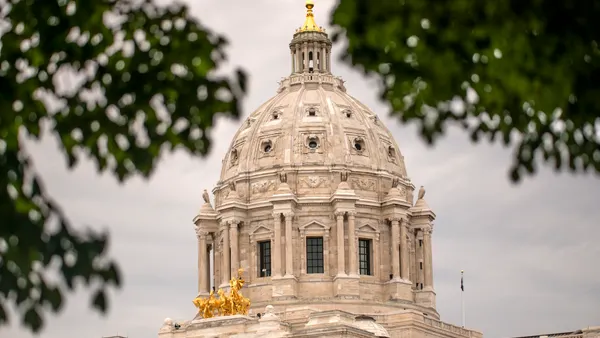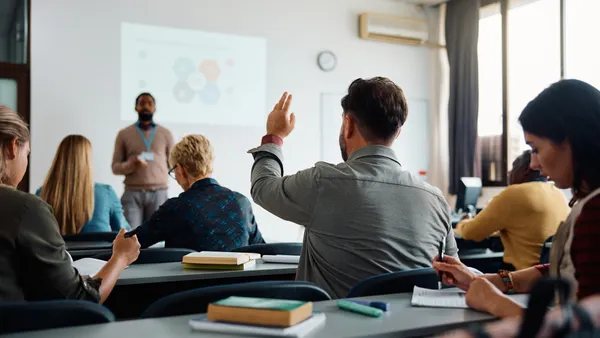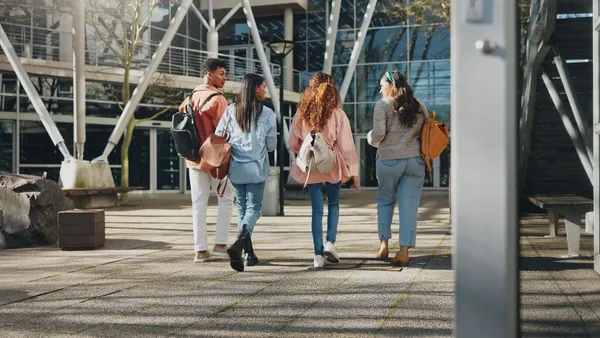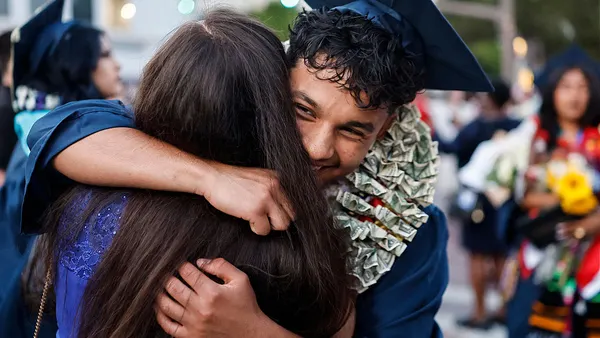While visiting two U.K. colleges in 2017, the dean of Shenandoah University's Conservatory had a radical idea. Both colleges — the Royal Welsh College of Music and Drama and London's Trinity Laban — halted some instruction and turned the reins over to students for a portion of the academic term so they could create and perform projects.
What if he brought that same practice back to Shenandoah?
When he returned to the Winchester, Virginia, campus, Michael Stepniak launched a task force of students and faculty members to devise how it would work. For one week, they decided, the conservatory school would cancel all classes across its two-dozen degree programs. Instead of heading to lectures, students would be free to create and rehearse artistic projects for a festival that culminated in the university's first-ever Student Performance Week.
Stepniak knew it would be risky. Though the overseas programs had been successful, he and other faculty members feared students would blow off the voluntary project, viewing the week as an opportunity to "play hooky."
"There was a best-case and worst-case scenario," he said.
The student response surprised him. After receiving more than 60 ideas from learners for collaborative projects, the task force whittled the suggestions down to 27 performances and five presentations, which ranged from genre-crossing musical ensembles to sketch comedy.
"I had a number of faculty [members] who said they felt a little useless during the start of that week because they're used to being mentors and then all of a sudden they were just observers," Stepniak said. "A couple of them ... said they started to realize that the success they saw in the students was an affirmation of the type of training that they were providing."
Shenandoah is far from alone in its pursuit of more hands-on learning opportunities for students. Over the past decade, more colleges have embraced experiential learning, which refers to activities that let students apply the skills they've learned in the classroom in a real-world setting. While these opportunities have typically taken the form of study abroad, co-ops and internships, more colleges are experimenting with immersive approaches that go a step beyond such programs.
The shift toward this type of learning stems partly from pressure on colleges to prove they're providing a return on investment for students. By giving students real-world skills, the thinking goes, institutions are ensuring they will be ready for the workplace.
Recent research backs that idea. Students who have internships related to their classroom learning or who complete long-term projects are more likely to feel engaged with their work upon graduation. And experiential learning is associated with a deeper understanding of course material and the ability to work well with others.
Those are the two outcomes Christopher Goodwin, a senior musical theater major, said he got from the performance week. As part of the task force, one of his jobs was to help plan the event. He also led a performance, in which he worked with about a dozen other students to write and perform a medley of songs.
The dual opportunities let Goodwin work on skills he wouldn't have been able to otherwise, such as communicating ideas across different disciplines while working with a team of people and carrying out a plan to completion.
"I learned more in that week that I learned in the last four years," he said.
His experience mirrors that of many of Shenandoah Conservatory's roughly 600 students. Out of 165 students who completed a survey on the experience, 163 said the college should do the performance week again, Stepniak said.
"I think [there] would be a student riot if we didn't continue it," he added.
Trading on experience
Like Shenandoah, colleges across the U.S. are bringing hands-on learning experiences into their curriculum. But small, private liberal arts colleges may feel more pressure to teach real-world skills with a clear market value because they often cost more to attend and face fierce competition for students.
In the 2018-19 academic year, undergraduates attending private, nonprofit four-year institutions full-time paid an average of $27,300 in costs after applying all grant aid and tax benefits — $12,400 more than what their peers at public four-year universities paid.
Meanwhile, more Americans are questioning the value of a four-year degree, while technical programs and community colleges are positioning themselves as a lower-cost alternative to traditional higher ed pathways.
"[Liberal arts colleges] are the ones that are on the front lines of these dual crises of affordability and employability," said Ryan Craig, co-founder and managing director of University Ventures, an investment firm focused on higher ed. "If you're paying $20-, $30-, $40,000 as tuition a year, you better get a great first job."
Yet nearly half (43%) of graduates are underemployed in their first job out of college, according to a report by Burning Glass Technologies. And the effects of that first job can be long lasting: Two-thirds of graduates who were underemployed in their first job are underemployed five years later.
"Young people no longer buy that tired old college line that, 'We prepare you for your fifth job, not your first job,' " Craig said. "They know that if you don't get a good first job, you're not likely to get a good fifth job."
Amid this environment, more small colleges are innovating with the types of experiential learning opportunities they offer. For instance, Wheaton College — a liberal arts school in Massachusetts serving fewer than 2,000 students — is using a four-year, $500,000 grant from the Andrew W. Mellon Foundation to send small groups of students to destinations within the U.S. to live and study for one semester.
Unlike other domestic study programs, pairs of Wheaton faculty members design and teach the 12-week curriculum, which includes three courses related to the location and an independent study. This past fall, students traveled to Hawaii to have firsthand experience studying the art, history, social structure and critical issues of the islands. And this May, they're headed to Puerto Rico to explore how gender-based violence is impacting life in the aftermath of Hurricane Maria.
"Young people no longer buy that tired old college line that, 'We prepare you for your fifth job, not your first job.' They know that if you don't get a good first job, you're not likely to get a good fifth job."

Ryan Craig
Co-founder, University Ventures
Touba Ghadessi, associate provost for academic administration and faculty affairs at Wheaton, said the students return with more self-confidence and passion and the ability to make mental connections — all skills that would be difficult to teach to the same degree in a lecture hall.
"They're outside of their classroom [and] outside of what they know at Wheaton," Ghadessi said. "Being in a situation that they are not familiar with allows them to grow 10 times more than they would in the classroom."
Wheaton leaders plan to use lessons learned from the trips to incorporate more experiential learning into their curriculum.
"We are lucky that we are in this [internal] curricular revision moment where we can completely change how we're doing things," Ghadessi said.
From living labs to internships
Small colleges aren't the only ones feeling the push to graduate students with real experience. Public colleges and systems are doing more to bake such experiences into the curriculum.
In 2016, the City University of New York launched an effort to increase student access to experiential learning opportunities. The system has also explored making these experiences a graduation requirement. The initiative recognizes it's no longer enough for a student to graduate with a degree. They also must be able to "demonstrate work readiness and prior relevant experience to prospective employers," New York Gov. Andrew Cuomo said in 2015.
Some public institutions, such as Kent State University and the University of Georgia, require students to complete an experiential learning program before they can earn a diploma. And more colleges are expecting students to have these kinds of experiences.
However, not all experiential learning during college happens within a course or degree program. For instance, through Georgia State University's Digital Learners to Leaders initiative, teams of students work on solving problems within the local community through the use of digitization and the internet of things.
"It's not tied to their GPA," said Tiffany Green-Abdullah, assistant director of learning community development. "When students are trying to learn something new, that can kind of hurt you sometimes."
Students in the program come from a wide variety of backgrounds; the current cohort has 55 students across 33 majors. This setup, Green-Abdullah said, gives students who aren't in tech-focused majors the chance to work on the skills needed to thrive in the digital economy.
As the teams go through the program, they learn from and receive feedback from professionals across different industries, which gives them insight into how to carry out and improve their projects.
One group in the fall 2018 cohort came up with a system called EcoDrop. Through an app, participants would earn points each time they drop off recyclables at collection machines scattered throughout high-traffic areas of a city. Those points could then be used to redeem products and services from partner companies.
Through the process of developing their projects, Green-Abdullah said, students learn the soft skills employers are looking for, such as problem-solving, project management and teamwork. "Those are not skills you explicitly learn in a class," she added.
And at nearby Georgia Piedmont Technical College, students in the automation and refrigeration program have had a similar opportunity to get real-world experience in their field.
Several years ago, the college's building automation students noticed that the school's heating and cooling systems often ran at the same time. By following the students' recommendations, the college saved a significant amount of money by sub-metering facilities, explains a report from the SEED Center. The students also set up motion sensors within classrooms to save further on energy costs, said Jeryll McWhorter, the college's program director of A/C technology, building automation systems and commercial refrigeration.
"You can't just send students off to business and industry or to a nonprofit and expect that it will be a meaningful experience. You really have to be deliberate and intentional [with] connecting it to the goals of the curriculum and the learning outcomes."

Lynn Pasquerella
President, Association of American Colleges and Universities
These types of living laboratories, as they're known, are not uncommon on community college campuses, McWhorter said. Several have cropped up across the country as one way for students to get hands-on learning experience while creating a greener campus.
"This is something that they would be exposed to in the workforce," McWhorter said. "They understood to a greater degree misusing energy and some of the basic things that can be done to reduce energy costs."
Connecting the dots
Academic experts warn that creating a useful experiential learning opportunity isn't as simple as including a real-world experience within the curriculum, whether it's through a co-op, internship or more experimental type of program.
"You can't just send students off to business and industry or to a nonprofit and expect that it will be a meaningful experience," said Lynn Pasquerella, president of the Association of American Colleges and Universities. "You really have to be deliberate and intentional [with] connecting it to the goals of the curriculum and the learning outcomes."
Pasquerella said this is one area for improvement: "Many institutions don't do a good job in looking at the ways in which experiential learning can be measured."
Though many colleges are experimenting with how to best structure and assess their experiential learning opportunities, Northeastern University has emerged as a leader. The private college launched its co-op program more than a century ago as a way for its students to earn money while in school. Since then, it's evolved as the bedrock of the college's educational approach, with more than 10,000 students undertaking a co-op assignment across 2,500 organizations during the 2017-18 academic year.
Katherine Ziemer, Northeastern's acting senior vice provost for undergraduate education and experiential learning, said the college checks in with students throughout their co-op experience to see how it's going. Northeastern also regularly asks employers what their needs are and for feedback on how students performed during their co-ops.
Colleges must ensure they're doing more than just helping students land a good first job, Ziemer noted. They also have to teach students how to be flexible and apply the skills they learned in the real world to a variety of different roles, especially in a rapidly changing job market.
"Experiential learning is more critical than ever," Pasquerella said. "That's the way to prepare students for a world in which the jobs of the future haven't been invented.”




